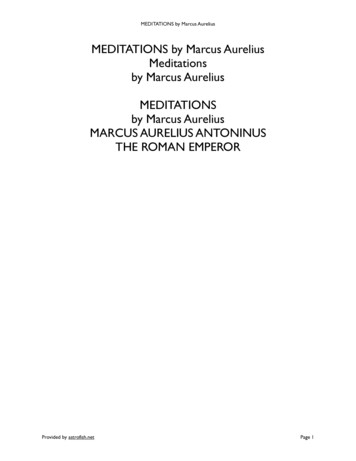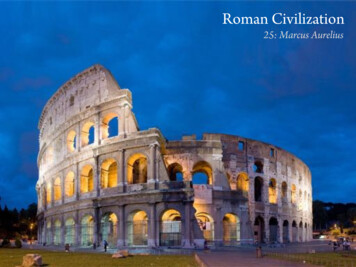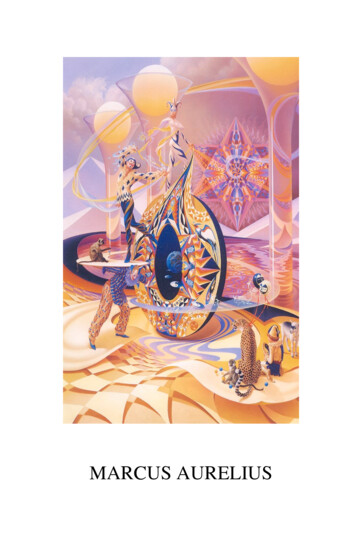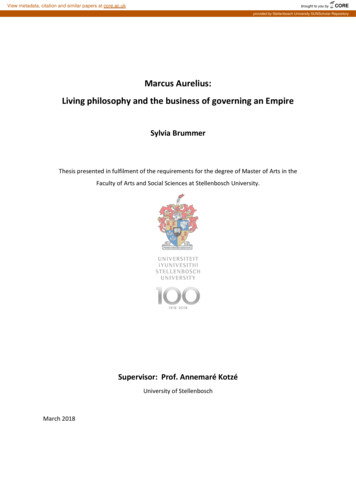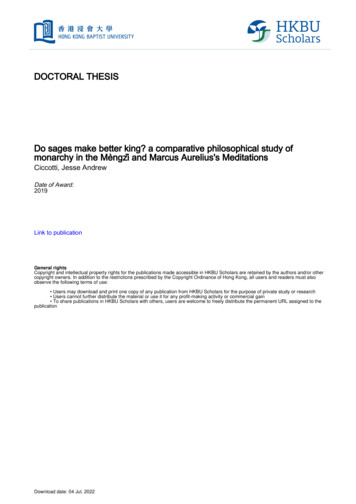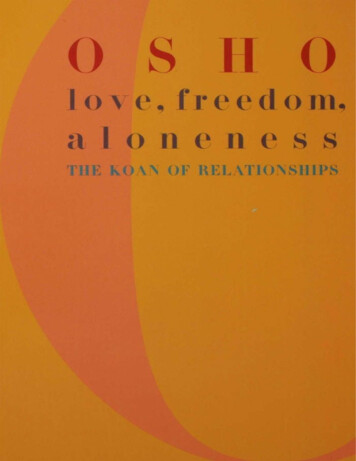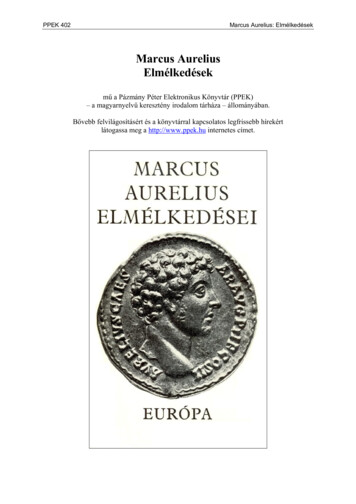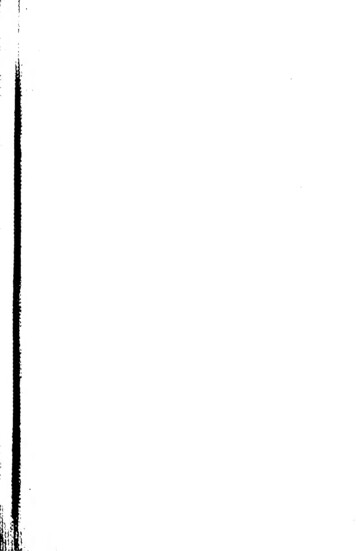
Transcription
Full Text Archivehttps://www.fulltextarchive.comMeditations by Marcus AureliusMeditationsMarcus AureliusCONTENTSNOTESINTRODUCTIONFIRST BOOKSECOND BOOKTHIRD BOOKFOURTH BOOKFIFTH BOOKSIXTH BOOKSEVENTH BOOKEIGHTH BOOKNINTH BOOKTENTH BOOKELEVENTH BOOKTWELFTH BOOKAPPENDIXGLOSSARYNOTESThis text was scanned by J. Boulton using Textbridge OCR. The Greek portions of the text havebeen added by hand and they will require the standard "Symbol" font "symbol.ttf" to be installedin the system fonts folder. This is a standard Windows font, so should be present on mostsystems. To contact the scanner e-mail: magicjon@ic24.net INTRODUCTION This is the Plain1 / 106
Full Text Archivehttps://www.fulltextarchive.comText version, see medma10h.txt or .zop for the HTML version with the various symbolsmentioned above.]MeditationsMarcus AureliusMARCUS AURELIUS ANTONINUS was born on April 26, A.D. 121. His real name was M.Annius Verus, and he was sprung of a noble family which claimed descent from Numa, secondKing of Rome. Thus the most religious of emperors came of the blood of the most pious of earlykings. His father, Annius Verus, had held high office in Rome, and his grandfather, of the samename, had been thrice Consul. Both his parents died young, but Marcus held them in lovingremembrance. On his father's death Marcus was adopted by his grandfather, the consularAnnius Verus, and there was deep love between these two. On the very first page of his bookMarcus gratefully declares how of his grandfather he had learned to be gentle and meek, and torefrain from all anger and passion. The Emperor Hadrian divined the fine character of the lad,whom he used to call not Verus but Verissimus, more Truthful than his own name. He advancedMarcus to equestrian rank when six years of age, and at the age of eight made him a memberof the ancient Salian priesthood. The boy's aunt, Annia Galeria Faustina, was married toAntoninus Pius, afterwards emperor. Hence it came about that Antoninus, having no son,adopted Marcus, changing his name to that which he is known by, and betrothed him to hisdaughter Faustina. His education was conducted with all care. The ablest teachers wereengaged for him, and he was trained in the strict doctrine of the Stoic philosophy, which was hisgreat delight. He was taught to dress plainly and to live simply, to avoid all softness and luxury.His body was trained to hardihood by wrestling, hunting, and outdoor games; and though hisconstitution was weak, he showed great personal courage to encounter the fiercest boars. Atthe same time he was kept from the extravagancies of his day. The great excitement in Romewas the strife of the Factions, as they were called, in the circus. The racing drivers used toadopt one of four colours--red, blue, white, or green--and their partisans showed an eagernessin supporting them which nothing could surpass. Riot and corruption went in the train of theracing chariots; and from all these things Marcus held severely aloof.In 140 Marcus was raised to the consulship, and in 145 his betrothal was consummated bymarriage. Two years later Faustina brought him a daughter; and soon after the tribunate andother imperial honours were conferred upon him.Antoninus Pius died in 161, and Marcus assumed the imperial state. He at once associated withhimself L. Ceionius Commodus, whom Antoninus had adopted as a younger son at the sametime with Marcus, giving him the name of Lucius Aurelius Verus. Henceforth the two arecolleagues in the empire, the junior being trained as it were to succeed. No sooner was Marcussettled upon the throne than wars broke out on all sides. In the east, Vologeses III. of Parthiabegan a long-meditated revolt by destroying a whole Roman Legion and invading Syria (162).Verus was sent off in hot haste to quell this rising; and he fulfilled his trust by plunging intodrunkenness and debauchery, while the war was left to his officers. Soon after Marcus had toface a more serious danger at home in the coalition of several powerful tribes on the northernfrontier. Chief among those were the Marcomanni or Marchmen, the Quadi (mentioned in thisbook), the Sarmatians, the Catti, the Jazyges. In Rome itself there was pestilence andstarvation, the one brought from the east by Verus's legions, the other caused by floods whichhad destroyed vast quantities of grain. After all had been done possible to allay famine and to2 / 106
Full Text Archivehttps://www.fulltextarchive.comsupply pressing needs--Marcus being forced even to sell the imperial jewels to find money--bothemperors set forth to a struggle which was to continue more or less during the rest of Marcus'sreign. During these wars, in 169, Verus died. We have no means of following the campaigns indetail; but thus much is certain, that in the end the Romans succeeded in crushing the barbariantribes, and effecting a settlement which made the empire more secure. Marcus was himselfcomanander-in-chief, and victory was due no less to his own ability than to his wisdom in choiceof lieutenants, shown conspicuously in the case of Pertinax. There were several importantbattles fought in these campaigns; and one of them has become celebrated for the legend ofthe Thundering Legion. In a battle against the Quadi in 174, the day seemed to he going infavour of the foe, when on a sudden arose a great storm of thunder and rain the lightning struckthe barbarians with terror, and they turned to rout. In later days this storm was said to havebeen sent in answer to the prayers of a legion which contained many Christians, and the nameThundering Legion should he given to it on this account. The title of Thundering Legion isknown at an earlier date, so this part of the story at least cannot be true; but the aid of the stormis acknowledged by one of the scenes carved on Antonine's Column at Rome, whichcommemorates these wars.The settlement made after these troubles might have been more satisfactory but for anunexpected rising in the east. Avidius Cassius, an able captain who had won renown in theParthian wars, was at this time chief governor of the eastern provinces. By whatever meansinduced, he had conceived the project of proclaiming himself emperor as soon as Marcus, whowas then in feeble health, should die; and a report having been conveyed to him that Marcuswas dead, Cassius did as he had planned. Marcus, on hearing the news, immediately patchedup a peace and returned home to meet this new peril. The emperors great grief was that hemust needs engage in the horrors of civil strife. He praised the qualities of Cassius, andexpressed a heartfelt wish that Cassius might not be driven to do himself a hurt before heshould have the opportunity to grant a free pardon. But before he could come to the east newshad come to Cassius that the emperor still lived; his followers fell away from him, and he wasassassinated. Marcus now went to the east, and while there the murderers brought the head ofCassius to him; but the emperor indignantly refused their gift, nor would he admit the men to hispresence.On this journey his wife, Faustina, died. At his return the emperor celebrated a triumph (176).Immediately afterwards he repaired to Germany, and took up once more the burden of war. Hisoperations were followed by complete success; but the troubles of late years had been toomuch for his constitution, at no time robust, and on March 17, 180, he died in Pannonia.The good emperor was not spared domestic troubles. Faustina had borne him several children,of whom he was passionately fond. Their innocent faces may still be seen in many a sculpturegallery, recalling with odd effect the dreamy countenance of their father. But they died one byone, and when Marcus came to his own end only one of his sons still lived--the weak andworthless Commodus. On his father's death Commodus, who succeeded him, undid the work ofmany campaigns by a hasty and unwise peace; and his reign of twelve years proved him to bea ferocious and bloodthirsty tyrant. Scandal has made free with the name of Faustina herself,who is accused not only of unfaithfulness, but of intriguing with Cassius and egging him on tohis fatal rebellion, it must be admitted that these charges rest on no sure evidence; and theemperor, at all events, loved her dearly, nor ever felt the slightest qualm of suspicion.As a soldier we have seen that Marcus was both capable and successful; as an administrator3 / 106
Full Text Archivehttps://www.fulltextarchive.comhe was prudent and conscientious. Although steeped in the teachings of philosophy, he did notattempt to remodel the world on any preconceived plan. He trod the path beaten by hispredecessors, seeking only to do his duty as well as he could, and to keep out corruption. Hedid some unwise things, it is true. To create a compeer in empire, as he did with Verus, was adangerous innovation which could only succeed if one of the two effaced himself; and underDiocletian this very precedent caused the Roman Empire to split into halves. He erred in his civiladministration by too much centralising. But the strong point of his reign was the administrationof justice. Marcus sought by-laws to protect the weak, to make the lot of the slaves less hard, tostand in place of father to the fatherless. Charitable foundations were endowed for rearing andeducating poor children. The provinces were protected against oppression, and public help wasgiven to cities or districts which might be visited by calamity. The great blot on his name, andone hard indeed to explain, is his treatment of the Christians. In his reign Justin at Romebecame a martyr to his faith, and Polycarp at Smyrna, and we know of many outbreaks offanaticism in the provinces which caused the death of the faithful. It is no excuse to plead thathe knew nothing about the atrocities done in his name: it was his duty to know, and if he did nothe would have been the first to confess that he had failed in his duty. But from his own tone inspeaking of the Christians it is clear he knew them only from calumny; and we hear of nomeasures taken even to secure that they should have a fair hearing. In this respect Trajan wasbetter than he.To a thoughtful mind such a religion as that of Rome would give small satisfaction. Its legendswere often childish or impossible; its teaching had little to do with morality. The Roman religionwas in fact of the nature of a bargain: men paid certain sacrifices and rites, and the godsgranted their favour, irrespective of right or wrong. In this case all devout souls were thrownback upon philosophy, as they had been, though to a less extent, in Greece. There were underthe early empire two rival schools which practically divided the field between them, Stoicism andEpicureanism. The ideal set before each was nominally much the same. The Stoics aspired tothe repression of all emotion, and the Epicureans to freedom from all disturbance; yet in theupshot the one has become a synonym of stubborn endurance, the other for unbridled licence.With Epicureanism we have nothing to do now; but it will be worth while to sketch the historyand tenets of the Stoic sect. Zeno, the founder of Stoicism, was born in Cyprus at some dateunknown, but his life may be said roughly to be between the years 350 and 250 B.C. Cyprushas been from time immemorial a meeting-place of the East and West, and although we cannotgrant any importance to a possible strain of Phoenician blood in him (for the Phoenicians wereno philosophers), yet it is quite likely that through Asia Minor he may have come in touch withthe Far East. He studied under the cynic Crates, but he did not neglect other philosophicalsystems. After many years' study he opened his own school in a colonnade in Athens called thePainted Porch, or Stoa, which gave the Stoics their name. Next to Zeno, the School of thePorch owes most to Chrysippus (280--207 b.c.), who organised Stoicism into a system. Of him itwas said, 'But for Chrysippus, there had been no Porch.'The Stoics regarded speculation as a means to an end and that end was, as Zeno put it, to liveconsistently omologonuenws zhn or as it was later explained, to live in conformity with nature.This conforming of the life to nature oralogoumenwz th fusei zhn. was the Stoic idea of Virtue.This dictum might easily be taken to mean that virtue consists in yielding to each naturalimpulse; but that was very far from the Stoic meaning. In order to live in accord with nature, it isnecessary to know what nature is; and to this end a threefold division of philosophy ismade--into Physics, dealing with the universe and its laws, the problems of divine government4 / 106
Full Text Archivehttps://www.fulltextarchive.comand teleology; Logic, which trains the mind to discern true from false; and Ethics, which appliesthe knowledge thus gained and tested to practical life. The Stoic system of physics wasmaterialism with an infusion of pantheism. In contradiction to Plato's view that the Ideas, orPrototypes, of phenomena alone really exist, the Stoics held that material objects alone existed;but immanent in the material universe was a spiritual force which acted through them,manifesting itself under many forms, as fire, aether, spirit, soul, reason, the ruling principle.The universe, then, is God, of whom the popular gods are manifestations; while legends andmyths are allegorical. The soul of man is thus an emanation from the godhead, into whom it willeventually be re-absorbed. The divine ruling principle makes all things work together for good,but for the good of the whole. The highest good of man is consciously to work with God for thecommon good, and this is the sense in which the Stoic tried to live in accord with nature. In theindividual it is virtue alone which enables him to do this; as Providence rules the universe, sovirtue in the soul must rule man.In Logic, the Stoic system is noteworthy for their theory as to the test of truth, the Criterion. Theycompared the new-born soul to a sheet of paper ready for writing. Upon this the senses writetheir impressions, fantasias and by experience of a number of these the soul unconsciouslyconceives general notions koinai eunoiai or anticipations. prolhyeis When the impression wassuch as to be irresistible it was called (katalnptikh fantasia) one that holds fast, or as theyexplained it, one proceeding from truth. Ideas and inferences artificially produced by deductionor the like were tested by this 'holding perception.' Of the Ethical application I have alreadyspoken. The highest good was the virtuous life. Virtue alone is happiness, and vice isunhappiness. Carrying this theory to its extreme, the Stoic said that there could be nogradations between virtue and vice, though of course each has its special manifestations.Moreover, nothing is good but virtue, and nothing but vice is bad. Those outside things whichare commonly called good or bad, such as health and sickness, wealth and poverty, pleasureand pain, are to him indifferent adiofora. All these things are merely the sphere in which virtuemay act. The ideal Wise Man is sufficient unto himself in all things, autarkhs and knowing thesetruths, he will be happy even when stretched upon the rack. It is probable that no Stoic claimedfor himself that he was this Wise Man, but that each strove after it as an ideal much as theChristian strives after a likeness to Christ. The exaggeration in this statement was, however, soobvious, that the later Stoics were driven to make a further subdivision of things indifferent intowhat is preferable (prohgmena) and what is undesirable. They also held that for him who hadnot attained to the perfect wisdom, certain actions were proper. (kaqhkonta) These were neithervirtuous nor vicious, but, like the indifferent things, held a middle place. Two points in the Stoicsystem deserve special mention. One is a careful distinction between things which are in ourpower and things which are not. Desire and dislike, opinion and affection, are within the powerof the will; whereas health, wealth, honour, and other such are general1y not so. The Stoic wascalled upon to control his desires and affections, and to guide his opinion; to bring his wholebeing under the sway of the will or leading principle, just as the universe is guided and governedby divine Providence. This is a special application of the favourite Greek virtue of moderation,(swfrosuum) and has also its parallel in Christian ethics. The second point is a strong insistenceon the unity of the universe, and on man's duty as part of a great whole. Public spirit was themost splendid political virtue of the ancient world, and it is here made cosmopolitan. It is againinstructive to note that Christian sages insisted on the same thing. Christians are taught thatthey are members of a worldwide brotherhood, where is neither Greek nor Hebrew, bond norfree and that they live their lives as fellow-workers with God.5 / 106
Full Text Archivehttps://www.fulltextarchive.comSuch is the system which underlies the Meditations of Marcus Aurelius. Some knowledge of it isnecessary to the right understanding of the book, but for us the chief interest lies elsewhere. Wedo not come to Marcus Aurelius for a treatise on Stoicism. He is no head of a school to lay downa body of doctrine for students; he does not even contemplate that others should read what hewrites. His philosophy is not an eager intellectual inquiry, but more what we should call religiousfeeling. The uncompromising stiffness of Zeno or Chrysippus is softened and transformed bypassing through a nature reverent and tolerant, gentle and free from guile; the grim resignationwhich made life possible to the Stoic sage becomes in him almost a mood of aspiration. Hisbook records the innermost thoughts of his heart, set down to ease it, with such moral maximsand reflections as may help him to bear the burden of duty and the countless annoyances of abusy life.It is instructive to compare the Meditations with another famous book, the Imitation of Christ.There is the same ideal of self-control in both. It should be a man's task, says the Imitation, 'toovercome himself, and every day to be stronger than himself.' 'In withstanding of the passionsstandeth very peace of heart.' 'Let us set the axe to the root, that we being purged of ourpassions may have a peaceable mind.' To this end there must be continual self-examination. 'Ifthou may not continually gather thyself together, namely sometimes do it, at least once a day,the morning or the evening. In the morning purpose, in the evening discuss the manner, whatthou hast been this day, in word, work, and thought.' But while the Roman's temper is a modestself-reliance, the Christian aims at a more passive mood, humbleness and meekness, andreliance on the presence and personal friendship of God. The Roman scrutinises his faults withseverity, but without the self-contempt which makes the Christian 'vile in his own sight.' TheChristian, like the Roman, bids 'study to withdraw thine heart from the love of things visible'; butit is not the busy life of duty he has in mind so much as the contempt of all worldly things, andthe 'cutting away of all lower delectations.' Both rate men's praise or blame at their realworthlessness; 'Let not thy peace,' says the Christian, 'be in the mouths of men.' But it is toGod's censure the Christian appeals, the Roman to his own soul. The petty annoyances ofinjustice or unkindness are looked on by each with the same magnanimity. 'Why doth a littlething said or done against thee make thee sorry? It is no new thing; it is not the first, nor shall itbe the last, if thou live long. At best suffer patiently, if thou canst not suffer joyously.' TheChristian should sorrow more for other men's malice than for our own wrongs; but the Roman isinclined to wash his hands of the offender. 'Study to be patient in suffering and bearing othermen's defaults and all manner infirmities,' says the Christian; but the Roman would never havethought to add, 'If all men were perfect, what had we then to suffer of other men for God?' Thevirtue of suffering in itself is an idea which does not meet us in the Meditations. Both alikerealise that man is one of a great community. 'No man is sufficient to himself,' says theChristian; 'we must bear together, help together, comfort together.' But while he sees a chiefimportance in zeal, in exalted emotion that is, and avoidance of lukewarmness, the Romanthought mainly of the duty to be done as well as might be, and less of the feeling which shouldgo with the doing of it. To the saint as to the emperor, the world is a poor thing at best. 'Verily itis a misery to live upon the earth,' says the Christian; few and evil are the days of man's life,which passeth away suddenly as a shadow.But there is one great difference between the two books we are considering. The Imitation isaddressed to others, the Meditations by the writer to himself. We learn nothing from theImitation of the author's own life, except in so far as he may be assumed to have practised hisown preachings; the Meditations reflect mood by mood the mind of him who wrote them. In theirintimacy and frankness lies their great charm. These notes are not sermons; they are not even6 / 106
Full Text Archivehttps://www.fulltextarchive.comconfessions. There is always an air of self-consciousness in confessions; in such revelationsthere is always a danger of unctuousness or of vulgarity for the best of men. St. Augus-tine isnot always clear of offence, and John Bunyan himself exaggerates venial peccadilloes intoheinous sins. But Marcus Aurelius is neither vulgar nor unctuous; he extenuates nothing, butnothing sets down in malice. He never poses before an audience; he may not be profound, he isalways sincere. And it is a lofty and serene soul which is here disclosed before us. Vulgar vicesseem to have no temptation for him; this is not one tied and bound with chains which he strivesto break. The faults he detects in himself are often such as most men would have no eyes tosee. To serve the divine spirit which is implanted within him, a man must 'keep himself purefrom all violent passion and evil affection, from all rashness and vanity, and from all manner ofdiscontent, either in regard of the gods or men': or, as he says elsewhere, 'unspotted bypleasure, undaunted by pain.' Unwavering courtesy and consideration are his aims.'Whatsoever any man either doth or saith, thou must be good;' 'doth any man offend? It isagainst himself that he doth offend: why should it trouble thee?' The offender needs pity, notwrath; those who must needs be corrected, should be treated with tact and gentleness; and onemust be always ready to learn better. 'The best kind of revenge is, not to become like untothem.' There are so many hints of offence forgiven, that we may believe the notes followedsharp on the facts. Perhaps he has fallen short of his aim, and thus seeks to call his principlesto mind, and to strengthen himself for the future. That these sayings are not mere talk is plainfrom the story of Avidius Cassius, who would have usurped his imperial throne. Thus theemperor faithfully carries out his own principle, that evil must be overcome with good. For eachfault in others, Nature (says he) has given us a counteracting virtue; 'as, for example, againstthe unthankful, it hath given goodness and meekness, as an antidote.'One so gentle towards a foe was sure to be a good friend; and indeed his pages are full ofgenerous gratitude to those who had served him. In his First Book he sets down to account allthe debts due to his kinsfolk and teachers. To his grandfather he owed his own gentle spirit, tohis father shamefastness and courage; he learnt of his mother to be religious and bountiful andsingle-minded. Rusticus did not work in vain, if he showed his pupil that his life neededamending. Apollonius taught him simplicity, reasonableness, gratitude, a love of true liberty. Sothe list runs on; every one he had dealings with seems to have given him something good, asure proof of the goodness of his nature, which thought no evil.If his was that honest and true heart which is the Christian ideal, this is the more wonderful inthat he lacked the faith which makes Christians strong. He could say, it is true, 'either there is aGod, and then all is well; or if all things go by chance and fortune, yet mayest thou use thineown providence in those things that concern thee properly; and then art thou well.' Or again,'We must needs grant that there is a nature that doth govern the universe.' But his own part inthe scheme of things is so small, that he does not hope for any personal happiness beyondwhat a serene soul may win in this mortal life. '0 my soul, the time I trust will be, when thou shaltbe good, simple, more open and visible, than that body by which it is enclosed;' but this is saidof the calm contentment with human lot which he hopes to attain, not of a time when thetrammels of the body shall be cast off. For the rest, the world and its fame and wealth, 'all isvanity.' The gods may perhaps have a particular care for him, but their especial care is for theuniverse at large: thus much should suffice. His gods are better than the Stoic gods, who sitaloof from all human things, untroubled and uncaring, but his personal hope is hardly stronger.On this point he says little, though there are many allusions to death as the natural end;doubtless he expected his soul one day to be absorbed into the universal soul, since nothingcomes out of nothing, and nothing can be annihilated. His mood is one of strenuous weariness;7 / 106
Full Text Archivehttps://www.fulltextarchive.comhe does his duty as a good soldier, waiting for the sound of the trumpet which shall sound theretreat; he has not that cheerful confidence which led Socrates through a life no less noble, to adeath which was to bring him into the company of gods he had worshipped and men whom hehad revered.But although Marcus Aurelius may have held intellectually that his soul was destined to beabsorbed, and to lose consciousness of itself, there were times when he felt, as all who hold itmust sometimes feel, how unsatisfying is such a creed. Then he gropes blindly after somethingless empty and vain. 'Thou hast taken ship,' he says, 'thou hast sailed, thou art come to land, goout, if to another life, there also shalt thou find gods, who are everywhere.' There is more in thisthan the assumption of a rival theory for argument's sake. If worldly things 'be but as a dream,the thought is not far off that there may be an awakening to what is real. When he speaks ofdeath as a necessary change, and points out that nothing useful and profitable can be broughtabout without change, did he perhaps think of the change in a corn of wheat, which is notquickened except it die? Nature's marvellous power of recreating out of Corruption is surely notconfined to bodily things. Many of his thoughts sound like far-off echoes of St. Paul; and it isstrange indeed that this most Christian of emperors has nothing good to say of the Christians.To him they are only sectaries 'violently and passionately set upon opposition.Profound as philosophy these Meditations certainly are not; but Marcus Aurelius was toosincere not to see the essence of such things as came within his experience. Ancient religionswere for the most part concerned with outward things. Do the necessary rites, and you propitiatethe gods; and these rites were often trivial, sometimes violated right feeling or even morality.Even when the gods stood on the side of righteousness, they were concerned with the act morethan with the intent. But Marcus Aurelius knows that what the heart is full of, the man will do.'Such as thy thoughts and ordinary cogitations are,' he says, 'such will thy mind be in time.' Andevery page of the book shows us that he knew thought was sure to issue in act. He drills hissoul, as it were, in right principles, that when the time comes, it may be guided by them. To waituntil the emergency is to be too late. He sees also the true essence of happiness. 'If happinessdid consist in pleasure, how came notorious robbers, impure abominable livers, parricides, andtyrants, in so large a measure to have their part of pleasures?' He who had all the world'spleasures at command can write thus 'A happy lot and portion is, good inclinations of the soul,good desires, good actions.'By the irony of fate this man, so gentle and good, so desirous of quiet joys and a mind free fromcare, was set at the head of the Roman Empire when great dangers threatened from east andwest. For several years he himself commanded his armies in chief. In camp before the Quadi hedates the first book of his Meditations, and shows how he could retire within himself amid thecoarse clangour of arms. The pomps and glories which he despised were all his; what to mostmen is an ambition or a dream, to him was a round of weary tasks which nothing but the sternsense of duty could carry him through. And he did his work well. His wars were slow andtedious, but successful. With a statesman's wisdom he foresaw the danger to Rome of thebarbarian hordes from the north, and took measures to meet it. As it was, his settlement gavetwo centuries of respite to the Roman Empire; had he fulfilled the plan of pushing the imperialfrontiers to the Elbe, which seems to have been in his mind, much more might have beenaccomplished. But death cut short his designs.Truly a rare opportunity was given to Marcus Aurelius of showing what the mind can do indespite of circumstances. Most peaceful of warriors, a magnificent monarch whose ideal was8 / 106
Full Text Archivehttps://www.fulltextarchive.comquiet happiness in home life, bent to obscurity yet born to greatness, the loving father ofchildren who died young or turned out hateful, his life was one paradox. That nothing might lack,it was in camp before the face o
FIRST BOOK SECOND BOOK THIRD BOOK FOURTH BOOK FIFTH BOOK SIXTH BOOK SEVENTH BOOK EIGHTH BOOK NINTH BOOK TENTH BOOK ELEVENTH BOOK TWELFTH BOOK APPENDIX GLOSSARY NOTES This text was scanned by J. Boulton using Textbridge OCR. The Greek portions of the text have been added by hand and they will require the standard "Symbol" font "symbol.ttf" to be .
